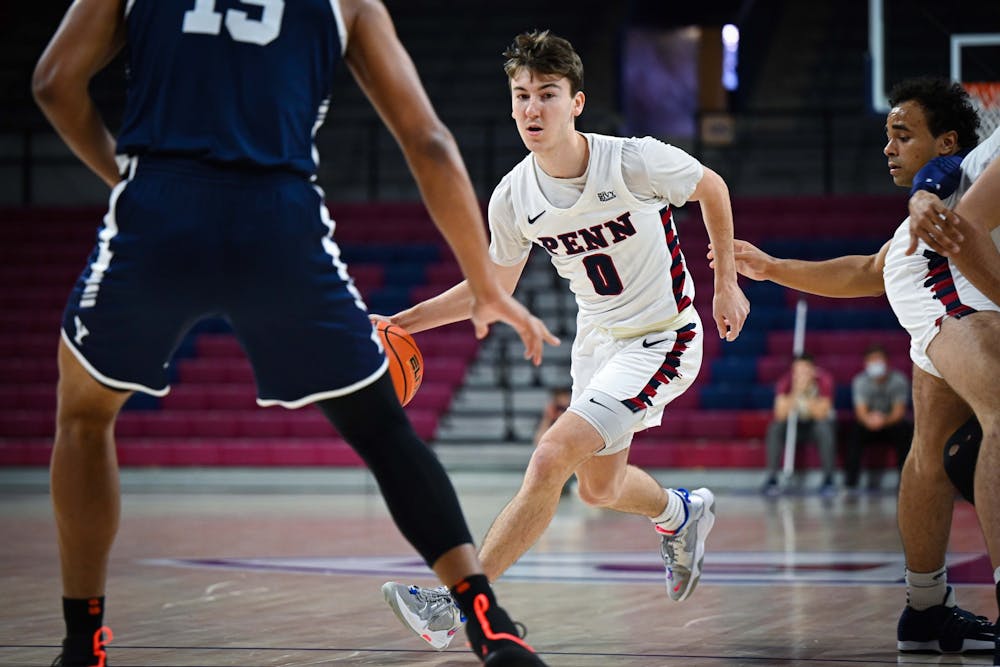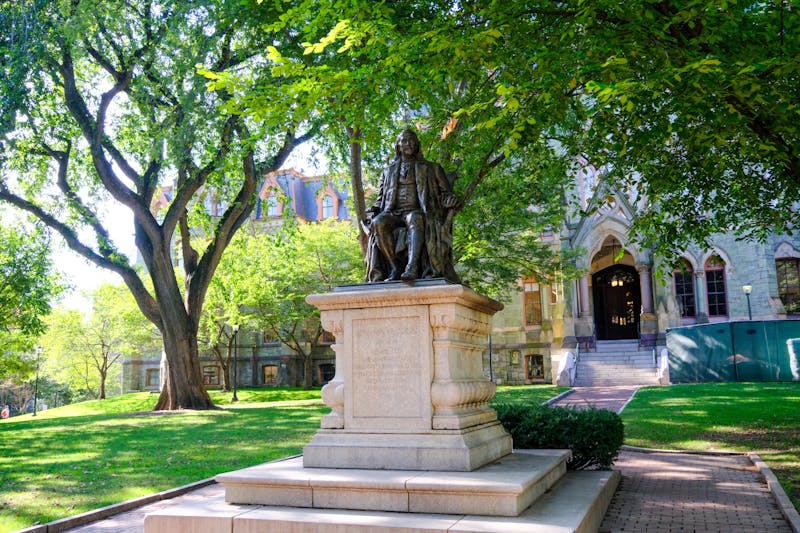
It doesn’t take an NBA scout to tell that there isn’t one singular characteristic that connects the world’s best basketball players together.
But if there is one, it’s the Little Brother Theory.
And sophomore guard Clark Slajchert might be the best representation of this theory on Penn men’s basketball. While he may have started as just another young player on Penn’s roster, Slajchert has now become a staple of the Quakers' offense known for his tenacity on the hardwood.
The Little Brother Theory suggests that the NBA’s best are younger brothers. Just take Michael Jordan, for example. As the youngest child in his family of seven, Jordan grew up to become the face of basketball.
The logic behind this idea is rooted in competition. The younger sibling, throughout childhood, is put at a disadvantage in just about every athletic matchup with the older siblings. As such, the younger sibling’s determination and grit must outmatch that of their brothers and sisters.
When watching Slajchert’s play on the court, it quickly becomes clear that he’s had to fight for his share of the ball.
Unsurprisingly, the Slajchert household is a basketball dynasty.
Slajchert’s father, Davis, was recruited by Yale and played briefly on the team there. The second oldest son in the family, J.D., played basketball at UC Santa Barbara from 2014-18. The third oldest, Wes, is a senior currently playing at Dartmouth.
Growing up, Clark Slajchert wasn’t going up against rookies.
“We would always play two-on-two in the backyard, with me and Clark matched up against each other,” Wes Slajchert said. “Neither one of us really got to shoot it much or got the ball much because we were so much younger than our older brothers.”
It was through these impromptu two-on-two showdowns that Clark Slajchert grew into who he is today, both on and off the court.
“That's how me and him both learned that every single opportunity we get, we’re going to have to fight for it,” Wes Slajchert said. “If we want the ball, we got to go get a rebound or get a steal, because it’s not going to be passed to us.”
“I was always a competitive kid,” Clark Slajchert said. “That just comes from competing with my brothers all the time outside playing basketball.”
Slajchert shows this never-quit mentality with his play on the hardwood every day. Ask any of his coaches or teammates, and they’ll describe Slajchert with two words: swagger and confidence.
“From the moment he got on campus last spring, he came down and knew he was good,” Penn men’s basketball coach Steve Donahue said. “He wants to prove it almost every play.”
Whenever Penn’s star guard Jordan Dingle is off the floor, Donahue and staff have needed to insert a jolt of instant offense. And the solution has often fallen on Slajchert.
“He’s someone that we can rely on as a scorer, in particular, when Jordan's off the court,” Donahue said. “There's been a lot of stretches in these games in the Ivies where we need a bucket and we go to him.”
And it’s not just on the offensive end that Slajchert has shined. While he might not scare anyone with his 6-foot-1 stature alone, Slajchert has proven reliable on the defensive end as well. Teams will often target him on defense looking for an easy mismatch. They quickly realize, though, that he’s much more than they bargained for.
“For someone his size and stature to be on the court, physically, Clark almost had to be as confident he is,” Donahue said. “That's why he’s at this level, succeeding.”
But again, being smaller than everyone else on the court is nothing new for Slajchert.
“I remember when it first really started to click for him in our first high school game together,” Wes Slajchert said. “I was playing point guard and I knew Clark was really good, but I didn’t know exactly what to expect when playing with him — I'd never played with him in an organized setting before.”
At their high school, Oak Park in Thousand Oaks, Calif., Clark and Wes shared the court for the first time together during a summer game. While it was already Wes’ third season playing for Oak Park, it was Clark’s very first high school game.
But that didn’t stop Clark from looking like a seasoned veteran in his debut.
“He had like 30 points and he missed maybe one or two shots, and everyone just went nuts,” Wes Slajchert said.
When one of his earliest memories is getting screamed at during an AAU basketball game at the age of five, it’s no wonder Clark Slajchert was able to so easily dominate the local high school circuit.
“He’s just a guy that’s always stepped up to the big moments and silenced doubters every single time,” Wes Slajchert said.
In the spring of 2021, Clark Slajchert suffered a one-in-a-million freak injury.
With the 2020-21 Ivy League basketball season canceled due to COVID-19, Penn men’s basketball was not officially in season. Despite that, the team continued to practice to prepare for the next season.
After being inadvertently hit in his upper leg, what would normally result in a temporary contusion, quickly became much more.
Before he knew it, Slajchert’s first semester in Philadelphia took a turn for the worse.
“I got kneed in my quad and I had to get surgery on it,” Slajchert said. “I got hit and it was swelling so much that they had to cut me open just to stop it.”
It was sudden and unexpected — a true freak accident.
“I think anytime you have a serious injury, and especially when you have surgery, it’s a mental block,” Slajchert said. “It’s something that you have to work through, and it’s something that I continue to work through.”
Fortunately for Slajchert, he’s had a strong support system throughout. Simply being able to share stories with his teammates was extraordinarily helpful.
“Athletes face mental adversity like this all the time,” Slajchert said. “All athletes go through injuries, so I wasn't alone.”
But above all, his family was there for him. They were able to drop everything at a moment’s notice, for Clark.
“He can put his guard down with us, with the family, and especially with me, because I know him so well,” Wes Slajchert said. “We’re close in age and have gone through a lot of the same experiences as younger brothers having two older brothers who push us around — we have to battle.”
Wes Slajchert was back home in Thousand Oaks when he got the news of Clark’s injury. The two had been in constant contact throughout the spring semester. But at the news of his injury, Wes Slajchert’s usual interest in Clark’s basketball progress became an afterthought, and concern for Clark, as his brother, took over.
Amidst the chaos of hearing the news, the Slajchert family all tried to get to Clark as fast as possible from Los Angeles. Different family members were finding themselves on different flights, and at different times, in the rush to get to Philadelphia.
“I flew out there alone,” Wes Slajchert said. “Right when I heard, I ended up being able to [fly out], get into the hospital with him, and sit by his bedside.”
While Clark was recovering, Wes was by his side until the rest of the family could congregate.
“We were so proud of him, the way he dealt with [the injury],” Wes Slajchert said. “The guy’s always been a fighter and he never backs down from anything. But this was a whole new type of challenge. He took it in stride and he was a warrior the whole time.”
Day in, day out, throughout his life, Clark Slajchert has worked tirelessly, battling his older brothers. That’s who he is. That’s who he had to be.
“I don’t think, from a competitive standpoint, I would be here without the confrontations with my brother,” Michael Jordan said in the ESPN documentary "The Last Dance." “When you come to blows with someone you absolutely love, that’s igniting every fire within you.”
Against the seemingly unsurmountable challenge, Clark honed his skills to become a focal point for Penn, as the team heads towards the Ivy tournament in March.
The Daily Pennsylvanian is an independent, student-run newspaper. Please consider making a donation to support the coverage that shapes the University. Your generosity ensures a future of strong journalism at Penn.
Donate






